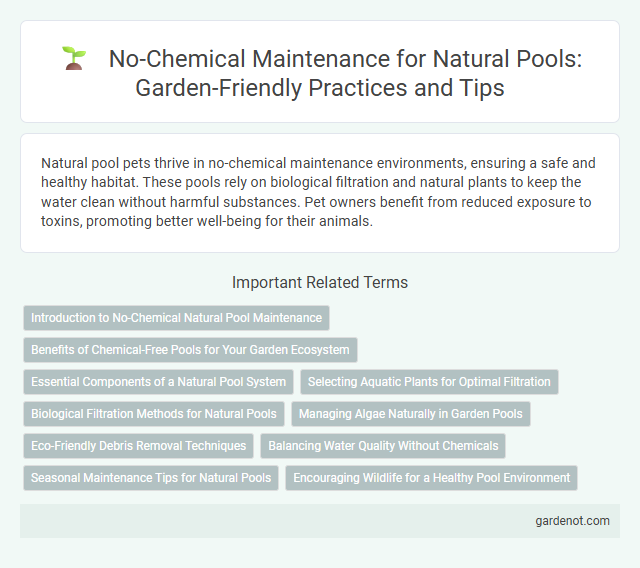Natural pool pets thrive in no-chemical maintenance environments, ensuring a safe and healthy habitat. These pools rely on biological filtration and natural plants to keep the water clean without harmful substances. Pet owners benefit from reduced exposure to toxins, promoting better well-being for their animals.
Introduction to No-Chemical Natural Pool Maintenance
No-chemical natural pool maintenance relies on biological filtration systems such as plants and beneficial bacteria to keep water clean and clear without synthetic additives. This eco-friendly approach reduces environmental impact and promotes a balanced aquatic ecosystem by using natural elements to manage algae and pathogens. Regular monitoring of pH levels, water circulation, and plant health ensures effective, chemical-free pool care.
Benefits of Chemical-Free Pools for Your Garden Ecosystem
Chemical-free natural pools enhance your garden ecosystem by supporting biodiversity and promoting a balanced aquatic environment without harmful toxins. These pools eliminate the need for harsh disinfectants, preserving beneficial microorganisms and plant life that contribute to natural water filtration. The absence of chemicals ensures safer habitat for wildlife and reduces the risk of soil and water contamination in your garden.
Essential Components of a Natural Pool System
Natural pool systems rely on a biological filtration process that eliminates the need for chemical treatments, ensuring eco-friendly water maintenance. Essential components include a regeneration zone filled with aquatic plants that absorb nutrients and support beneficial microbes to purify the water naturally. A mechanical filtration system captures debris while a circulation pump maintains water flow, facilitating optimal oxygenation and preventing stagnation.
Selecting Aquatic Plants for Optimal Filtration
Selecting aquatic plants such as water lilies, cattails, and hornwort enhances natural pool filtration by absorbing nutrients and reducing algae growth. These plants improve water clarity and oxygenate the pool, supporting a balanced ecosystem without chemical treatments. Strategic placement of submerged and emergent species maximizes filtration efficiency and sustains water quality naturally.
Biological Filtration Methods for Natural Pools
Biological filtration methods in natural pools rely on beneficial bacteria and aquatic plants to break down organic matter and purify water without chemicals. These systems use biofilters, such as gravel beds and constructed wetlands, to promote microbial activity that removes contaminants and supports a balanced ecosystem. Maintaining a thriving biological filtration process ensures clear, healthy water while preserving the pool's natural environment.
Managing Algae Naturally in Garden Pools
Natural pools rely on biological filtration systems and aquatic plants to maintain water clarity without chemicals. Beneficial bacteria and algae-eating species such as snails and certain fish help control algae growth by competing for nutrients. Regularly adjusting water flow and promoting shade through plants reduces excessive sunlight, minimizing algae proliferation in garden pools.
Eco-Friendly Debris Removal Techniques
Natural pools employ eco-friendly debris removal techniques such as manual skimming, use of aquatic plants, and biological filtration systems to maintain water clarity without chemicals. Beneficial plants like water lilies and reeds absorb nutrients that would otherwise promote algae growth, while microorganisms break down organic matter, sustaining a balanced ecosystem. These methods reduce environmental impact and support biodiversity, ensuring sustainable, chemical-free pool maintenance.
Balancing Water Quality Without Chemicals
Maintaining a natural pool involves balancing water quality without the use of chemicals by harnessing biological filtration and plant-based purification. Beneficial bacteria and aquatic plants work together to break down organic matter, reducing algae growth and keeping the water clear and healthy. This eco-friendly approach creates a sustainable, chemical-free swimming environment that supports local wildlife and preserves natural ecosystems.
Seasonal Maintenance Tips for Natural Pools
Seasonal maintenance of natural pools involves regular skimming of debris during fall and spring to prevent organic buildup that can affect water clarity. Monitoring aquatic plants and trimming overgrowth ensures balanced filtration and natural purification without chemicals. Regularly checking water levels and adjusting circulation systems supports a stable ecosystem, reducing the need for chemical intervention.
Encouraging Wildlife for a Healthy Pool Environment
Natural pools rely on biological filtration and plant-based ecosystems to maintain water clarity and balance without chemicals. Encouraging native wildlife such as beneficial insects, amphibians, and microorganisms helps control algae growth and supports a self-sustaining aquatic environment. Surrounding the pool with diverse vegetation creates habitats that promote biodiversity and enhance the overall health of the water system.
No-chemical maintenance Infographic

 gardenot.com
gardenot.com